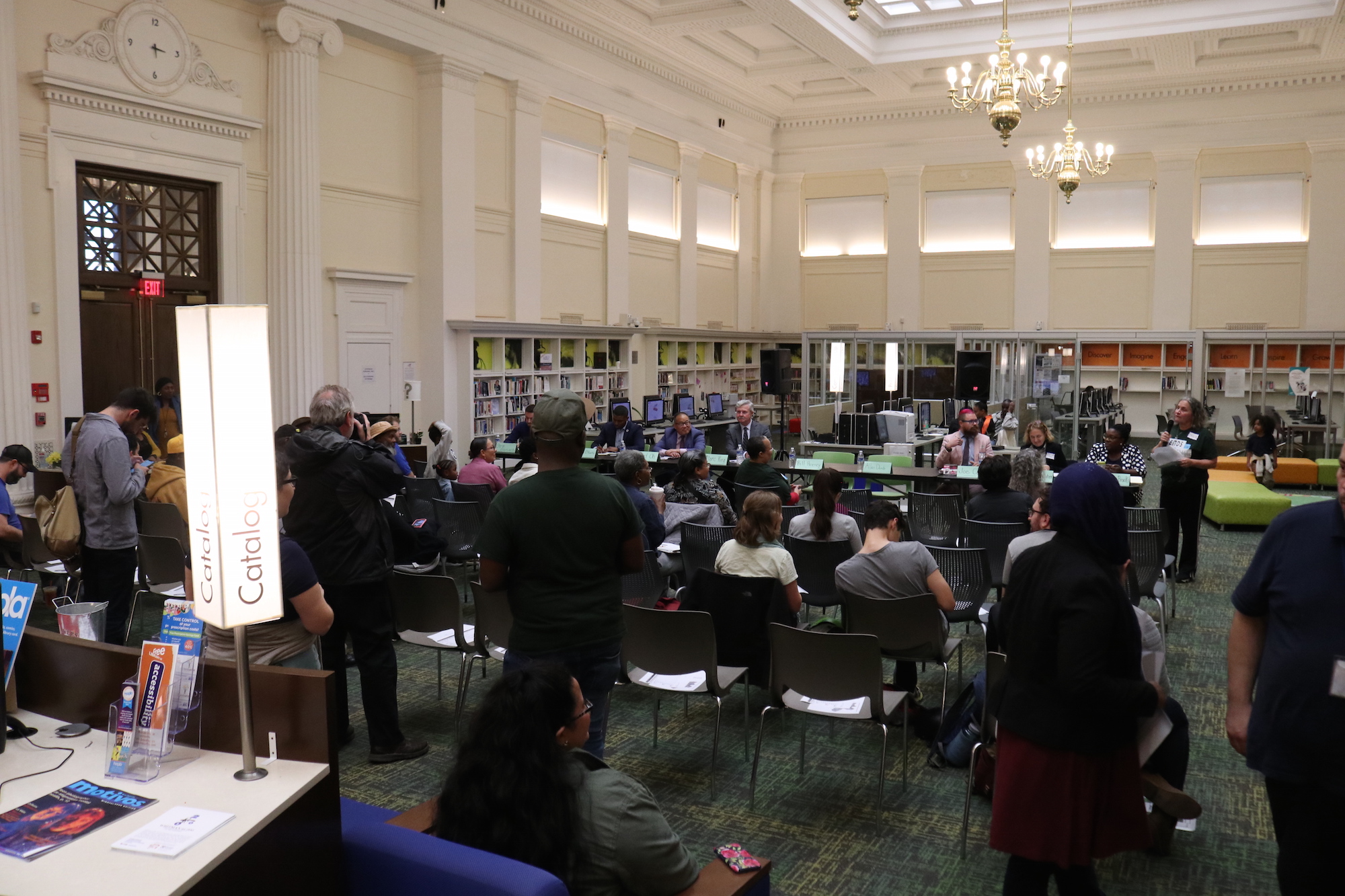
A rundown of Philadelphia’s first at-large candidates forum
In an event that was the first of its kind during election season, eight at-large candidates gathered at Lillian Marrero Library on Lehigh Ave. on Oct. 21 to tell the attending community members why they need their vote in less than two weeks time for a spot on City Council.
Organized by the Friends of the Free Library, the candidates spoke through a plethora of Philadelphia’s issues, from its poverty and rise in gun violence to ailing libraries, the opioid crisis, immigration and mass incarceration.
The eight candidates that showed up were as follows: Republicans David Oh and Matt Wolfe, Working Families Party reps Kendra Brooks and Nicolas O’Rourke, Term Limits Party rep Steve Cherniavsky and Independents Sherrie Cohen, Joe Cox and Clarc King.
NOTE: The following order is that which the candidates were sat at the table on the night from right to left.
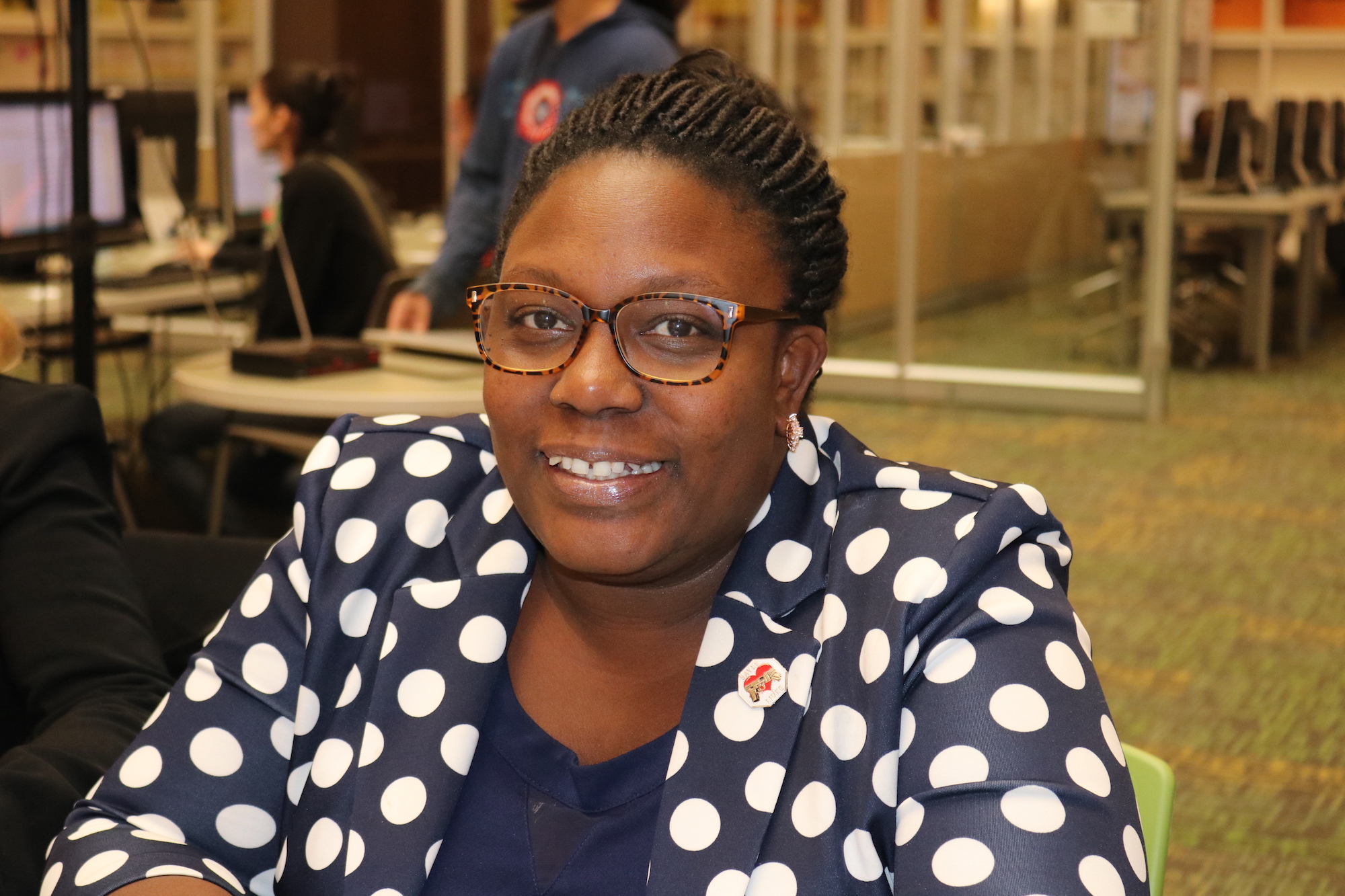
PARTY: Working Families Party
A mother, educator and grassroots activist, Kendra Brooks is a new name to burst onto the scene of Philly politics leading into November’s quickly-approaching general election. She’s received endorsements from big names in the city like Helen Gym and beyond, like Elizabeth Warren. Her and Nicolas O’Rourke’s campaign under the Working Families Party is shooting to take the two allotted minority seats from the Republican Party, but have seen some pushback from Democrats in the city.
SAVING LIBRARIES
Brooks mentioned her history of standing with libraries as a community organizer and their importance to her childhood.
“Libraries saved my life.”
For funding them, Brooks said more taxes should be levied against corporations in the city and some of the extra revenue should also go towards the parks and rec centers within Philadelphia, reminding attendees not to forget their importance alongside libraries.
POVERTY AND WAGES
Brooks said she herself is a low-wage worker. At 18 years old, Brooks was a student at the Community College of Philadelphia in debt and in need of employment. She couldn’t find any, and the experience has shaped her view that creating more pathways to jobs is the most important part of Philadelphia rising from poverty.
GUN VIOLENCE
As a mother, Brooks expressed dismay that there are children who have buried more friends than herself. She’s a Nicetown resident and founder of Nicetown Friends, an organization Brooks says is “taking the community back” from the violence without the police. She believes more funds should go towards similar organizations to see an impact.
ACHIEVING GOALS IN OFFICE
Brooks cited her experience as a community and coalition builder as proof of her ability to make the same connections once in office. She wants to talk “about the issues, and not argue,” and cited her campaign’s ability to tap into a progressive voting bloc as one that can also get something done at City Hall.
OPIOID CRISIS
Brooks did not comment on the opioid crisis.
PHILADELPHIA THE “WELCOMING CITY”
Brooks expressed support for Philadelphia’s status as a “sanctuary” city (NOTE: Philadelphia does not use this designation, instead opting for “welcoming”), and cited her past support for campaigns at Juntos as her standing in solidarity.
“Black and brown folks are the ones predominantly targeted,” she said, “including people that have lived here their whole lives.”
MASS INCARCERATION/RACIST JUSTICE SYSTEM
In the aftermath of the Plainview Project findings, which involved more than 300 Philadelphia officers’ racist Facebook grumblings, Brooks said she thinks all “should be fired” (only 13 were). The environment she hopes to create is one where no one is afraid to call out racism, and called on white allies to make that a reality.
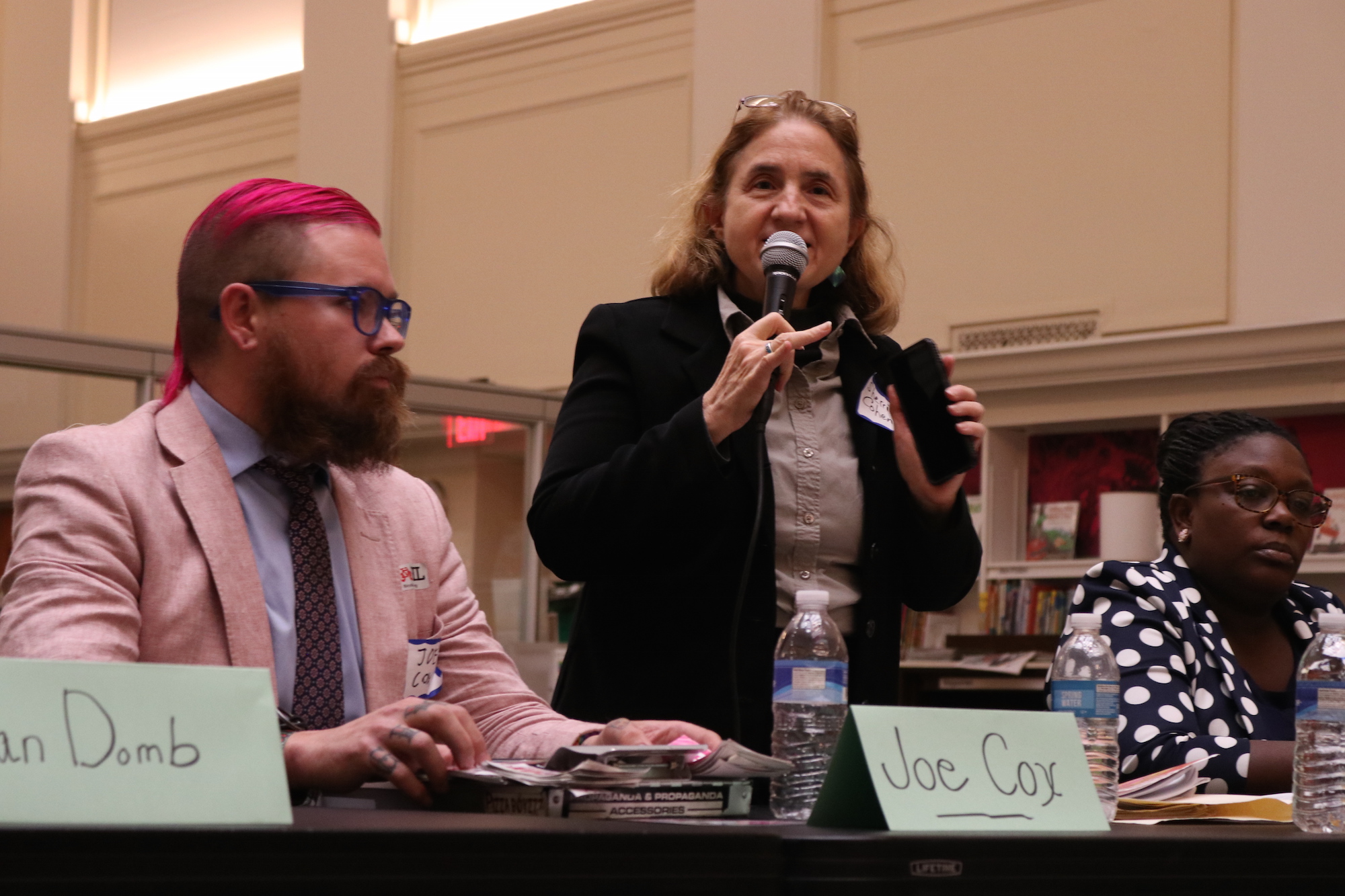
PARTY: A Better Council
One of the many progressives running outside of the established Democratic Party, Sherrie Cohen is a longtime advocate based in Ogontz with a serious passion for libraries. A self-branded Democratic Socialist, Cohen is pushing for an agenda that includes a $15 minimum wage, expanded low-income housing, a Green New Deal and more funding for schools and libraries.
SAVING LIBRARIES
Eleven years ago, Cohen fought for the existence of 11 libraries due to close in the city, including the David Cohen Ogontz branch in her home section of Philadelphia. She organized the Friends of David Cohen Ogontz to fight back and succeeded in keeping her branch in operation.
“Libraries are sacred spaces and sacred institutions.”
Her plan to fund them is an additional $15 million a year (long-asked-for, but never received) to keep libraries open at least six days a week for the community.
POVERTY AND WAGES
Cohen lays the blame for Philadelphia’s low minimum wage on state regulations that keep the city from raising it above $7.25. Despite the legal limitations, she believes the current bend of PA’s Supreme Court means Philly could sue and succeed in getting itself out of the legislation that limits its ability to act. Fifteen dollars an hour is Cohen’s campaign goal, but also admitted that even “$15 is not a lot.”
GUN VIOLENCE
Again, Cohen cited inactivity at the state level for Philly’s struggles, especially regarding the lack of liability for the owners of guns that are lost and stolen and then used in crimes. She believes a fight at the PA Supreme Court-level is worth it and would result in victory and serious change.
ACHIEVING GOALS IN OFFICE
Cohen’s key to accomplishing goals in office is involving the community, decrying the politicking of City Hall’s current inhabitants.
“Politicians often look to the wind to make decisions on issues,” she said.
OPIOID CRISIS
Cohen expressed support for Philadelphia’s contentious safe-injection site in Kensington because it results in “less needles and people on the street.”
PHILADELPHIA THE “WELCOMING CITY”
Cohen did not comment on Philadelphia’s status as a “welcoming” city.
MASS INCARCERATION/RACIST JUSTICE SYSTEM
For Cohen, "racialized" policing is a “top issue” and was the only candidate to mention the school-to-prison pipeline affecting many of the city’s disadvantaged youth. This track leads many young Philadelphians to have more interactions with the city’s police and end up in the cycle of mass incarceration. Cohen thinks way it’s set up now is an “offense to humanity.”
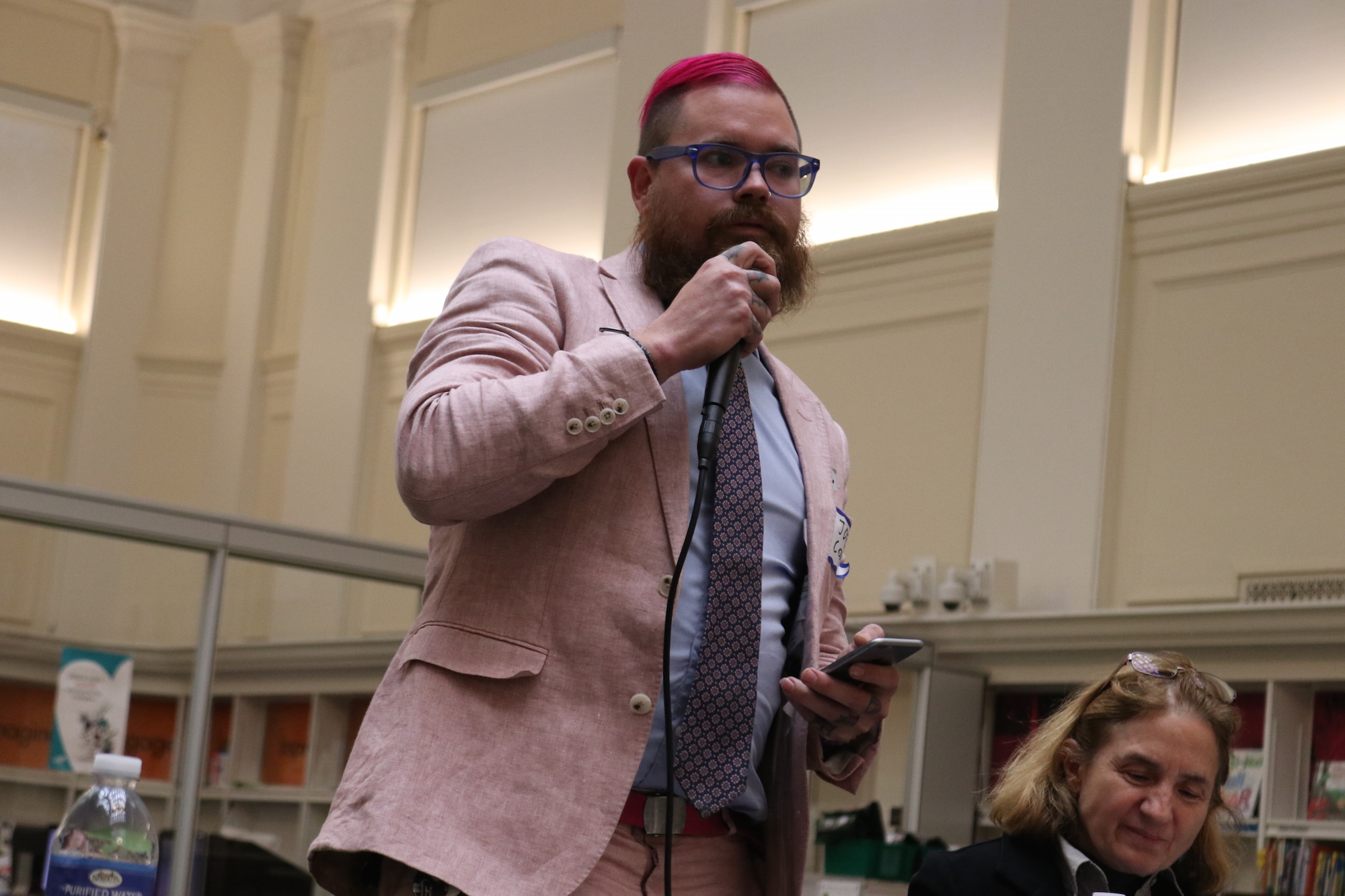
PARTY: Independent
Joe Cox might be the most famous bike messenger in all of Philadelphia with what he’s created with PMA. Standing for “Positive Mental Attitude”, PMA is the name for Cox’s bimonthly bike rides around different parts of the city to deliver pizza to the homeless. He announced his candidacy more than a year ago and is running on a progressive platform that prioritizes street safety, cleaning and accessibility, combating racist policing and green spaces.
NOTE: Cox left after introductions.
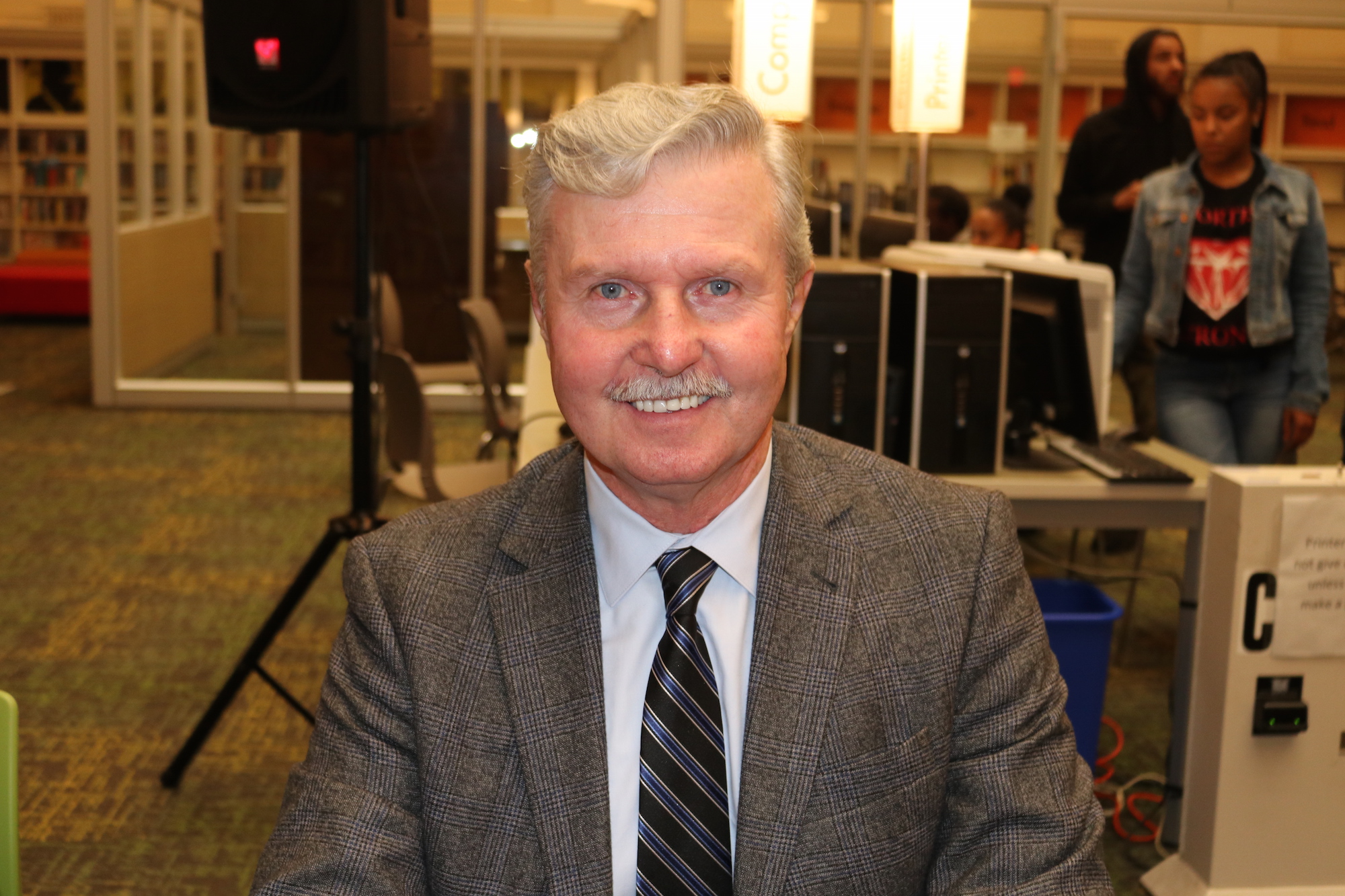
PARTY: Independent
Clarc King’s major message of the night and one that seeped into almost every answer he gave on every issue is the privatization of the public domain. In other words, King is a major opponent any sort of private investment of any kind in any government function for the influence it tends to have on the process. He also called poverty a “national security crisis.”
SAVING LIBRARIES
“Baseline civilization” were the words used by King to describe the importance of libraries to society and the city. After that, he went back to the tried and true argument of the private’s poisonous power of the public as a reason for Philly’s library troubles. He ended with the statement that there’s at least “$100 million” in other departments “just sitting there.”
POVERTY AND WAGES
For King, the low wages that plague the city’s working class are a result of Philly’s poor education system. He sees education as one of the many sections of the public domain tarnished by private interests. The resulting poverty in the city is a “national security crisis.”
GUN VIOLENCE
At the heart of Philly’s gun violence epidemic in King’s opinion is drugs. To combat those and the resulting violence, he is a proponent of increasing the amount of street police patrols in areas of high concentration. A large portion of the blame for its out-of-control nature he thinks is members of the community that don’t step up and call out those doing the crimes for police.
In regards to the youth, who are most susceptible to committing and being affected by the violence, King wants them “chaperoned” by the adults in the community.
ACHIEVING GOALS IN OFFICE
King’s message of unity within the political system was supported by his argument that “humanity wins” as a result. He also posed the question of “where does all the money go?”
“Even old people would rally around that.”
OPIOID CRISIS
He is not supporter of the safe injection site in Kensington, and thinks instead the addict should just be told that they need to “straighten up.”
PHILADELPHIA THE “WELCOMING CITY”
The divide created between Philadelphia’s government and the federal government over the city’s status as a “Welcoming City” that isn’t cooperative with all of Washington’s regulations creates “unnecessary friction” according to King. He admits it’s too difficult to become a citizen, but the answer is not by going against Washington.
MASS INCARCERATION/RACIST JUSTICE SYSTEM
“Mass incarceration is a crime” said King, before highlighting the private sector’s lucrative contracts running private prisons for the government.
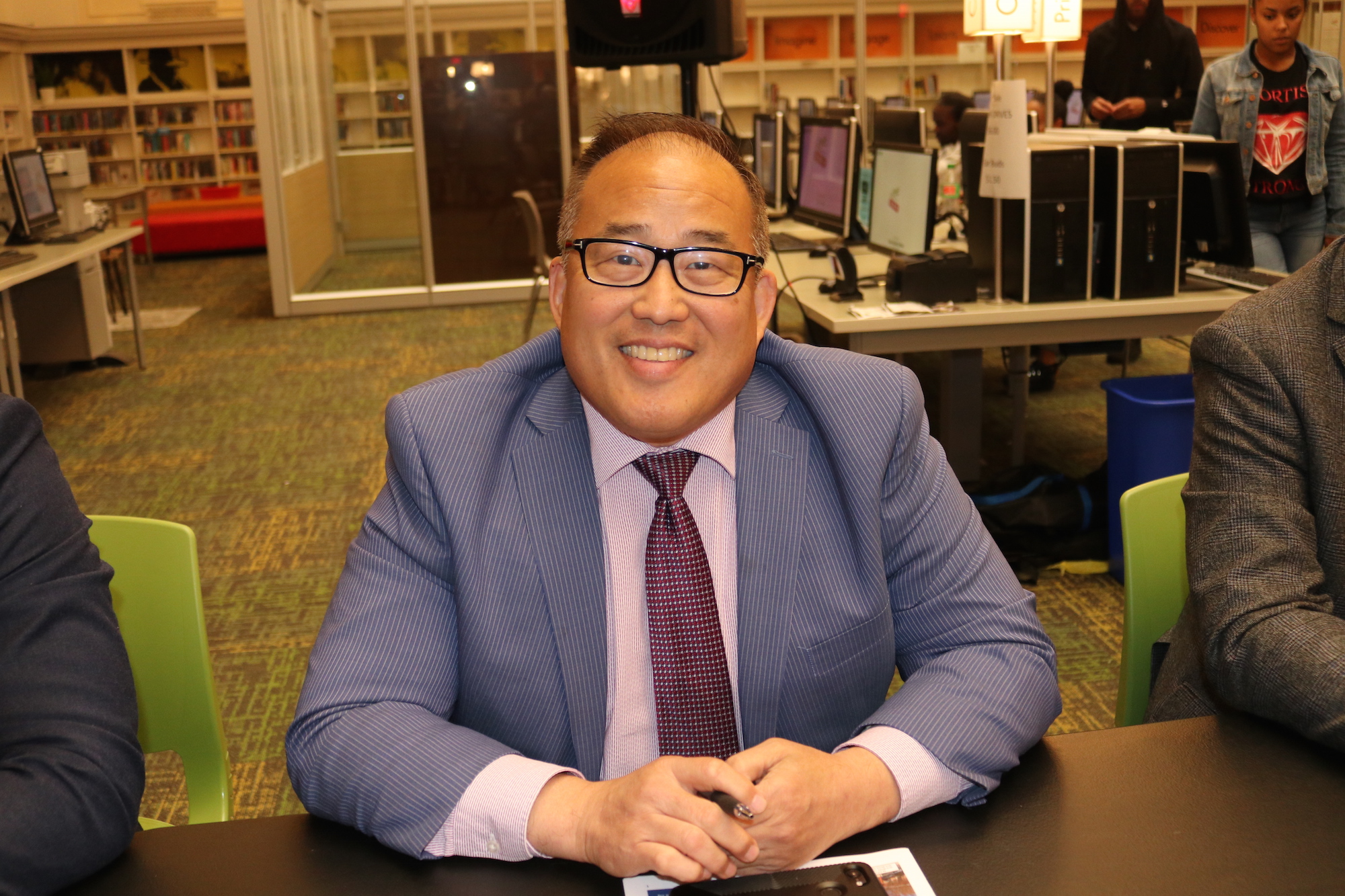
PARTY: Republican
David Oh was the only active at-large Councilmember to attend last Monday’s forum. He was elected to one of the minority seats first in 2011 and then re-elected in 2015. As one of the few Republican elected officials in the city, Oh says it means if people want something done, “they don’t come to me until they go to everyone else.”
“It means I have great sympathy for whoever comes to me.”
Two issues Oh highlighted in his opening statement his ongoing battles with the Philadelphia Parking Authority and Department of Human Services.
SAVING LIBRARIES
Oh lamented the lack of funding left anymore for branch libraries that are often the center of Philadelphia’s neighborhoods outside of Center City. He also said that the books they provide are no longer enough to adequately serve the city’s youth. In addition to being centers of literary knowledge and culture, Oh thinks they should also be centers of technological advancement too.
POVERTY AND WAGES
In his approach to Philadelphia’s poverty problem, Oh lays the blame on its underfunded community college. More than half of the Community College of Philadelphia’s budget comes from its students’ tuitions. Under state law, the local sponsor — the city — is required to cover a third of the college’s operating cost along with another third covered by the state. Currently, Philadelphia only funds 20% of CCP’s operating cost, and the state also lags far behind its agreed-upon annual amount.
In Oh’s opinion, the lack of funding for CCP makes not only the college inaccessible, which in turn, puts more higher-paying, technical jobs out of reach.
“There’s a lack of political will to get this done.”
GUN VIOLENCE
Oh is a proponent of funding grassroots, community intervention initiatives to curb the gun violence currently plaguing the city. He said there were programs put in place during Philadelphia’s last uptick in gun violence that worked that have gone away over time. Additionally, Oh said the creation of more jobs will reduce the violence along with, not more, but smarter policing techniques involving more technology and data.
ACHIEVING GOALS IN OFFICE
As an at-large councilmember, Oh does not receive an annual budget for any of his led initiatives. Instead, all of Oh’s programs since being a councilmember have been funded through his office’s own efforts. He highlighted the creation of PHL Live — an annual competition and event run out of his office that highlights Philly’s up-and-coming musical talent. Oh also believes his support of certain initiatives (that haven’t received support from other councilmembers) has boosted his reputation.
“Fighting gets me respect.”
OPIOID CRISIS
Oh cited his participation in seven community meetings thus far that have gauged the impact of the opioid crisis in Philadelphia communities and started creating solutions with the community. According to him, there are proven solutions to the crisis, but no funding in place to enact them. Regarding the safe-injection site in Kensington, Oh is not a supporter of it because of what he believes is Philly’s inability to support it for the region. The solution for him lies in acting as a region — citing the necessity of a safe-injection site in surrounding Chester, Bucks, Montgomery and Delaware counties, not just Philadelphia.
PHILADELPHIA THE “WELCOMING CITY”
Before running for office, Oh was an immigration lawyer, which means his office has sympathy for any immigrant that comes for assistance. He also told the story of his father, who came to Philadelphia as an immigrant from Korea to open the city’s first Korean-American church. His issue with immigration is the broken system full of too many loopholes that get abused. That, he says, is a federal issue, not one the city can do much for.
MASS INCARCERATION/RACIST JUSTICE SYSTEM
Oh’s take on the state of the Justice system is that it has “tolerated the breaking of the law” for too long. What he means is not the actions of the citizens, but some of the policies put in place by past legislators that are illegal on a federal level. His example was the racist policing tactic of “stop and frisk” that was found to unfairly target African-American males. Abiding by the law — for all involved — is Oh’s solution.
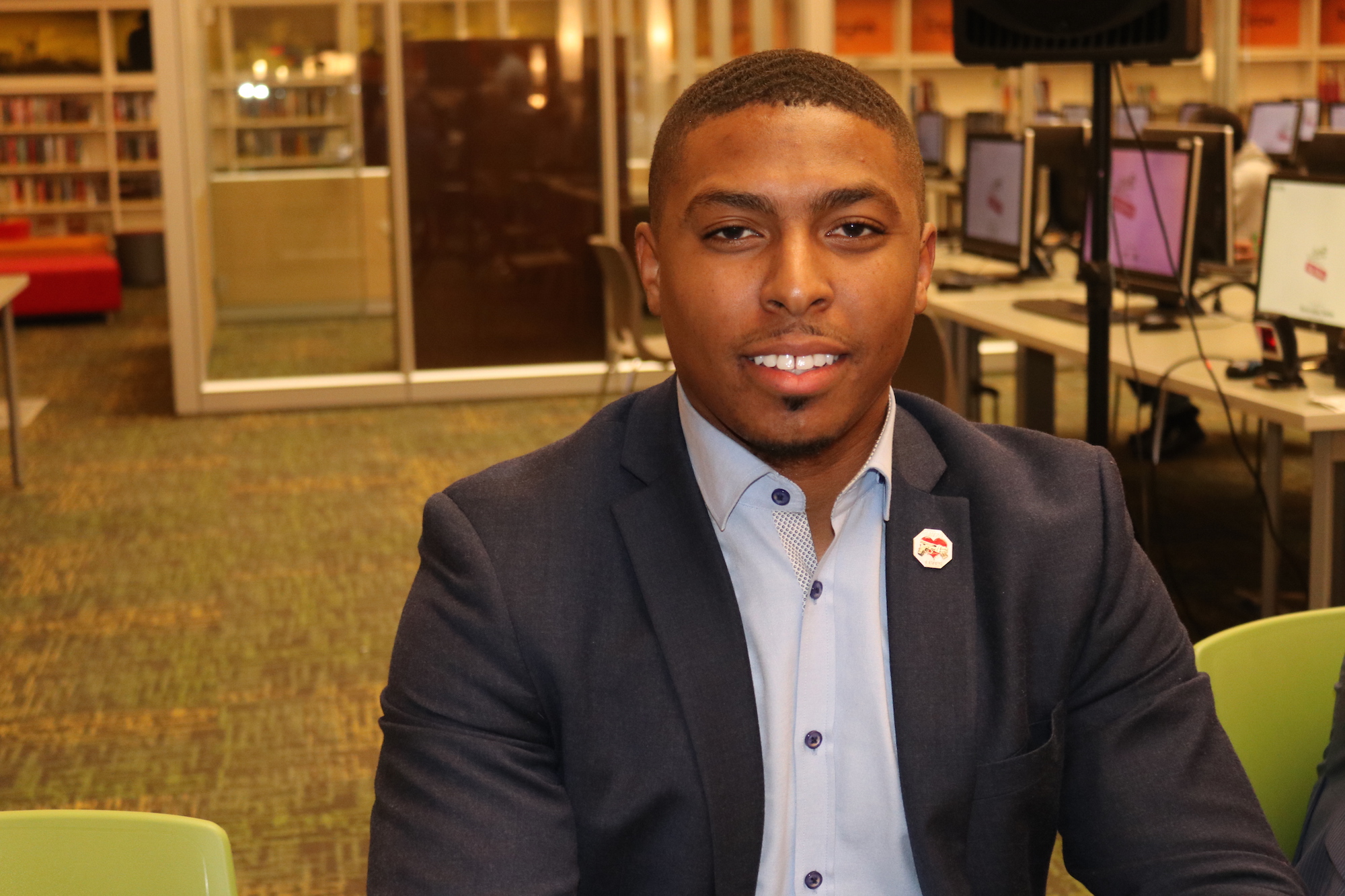
PARTY: Working Families Party
A longtime community organizer and pastor, Nicolas O’Rourke is the other half of the Working Families Party ticket that is looking to unseat the two Republicans that have long occupied the City Council seats reserved for minority parties. In his career, he’s organized on behalf of issues like public school funding and against ones like gentrification, mass incarceration and gun violence. For him, the power lies with the people and his and Brooks’ campaign is trying to manifest that into victory come November 5.
CONTENIDO RELACIONADO
“It’s no time to concede power, but advocate for them.”
SAVING LIBRARIES
In his response, O’Rourke channeled the words of the late Elijah Cummings, who remarked that librarians were the ones who helped him most in his upbringing. For funding, O’Rourke wants to do a review of where funds are allocated in the city budget and reallocate those that are “siphoned off” accordingly.
POVERTY AND WAGES
For O’Rourke, the poverty and low minimum wage present in Philadelphia is a “moral issue.” He reaffirmed his previous point of the current misallocation of funds in the city before calling for a $15-an-hour minimum wage.
“$7.25 is not a living wage. It’s evil.”
GUN VIOLENCE
This is O’Rourke’s number one issue as a candidate — according to what he said at the forum. For him, there is a direct correlation between gun violence and the city’s poverty.
“Poverty equals bullets.”
He cited leaders in the police department that have said that “you can’t arrest your way out” of the issue as a pushback against calls for more policing. Instead, he said he wants more accountability from the police department in the actions officers take towards communities of color. For a solution, O’Rourke called upon the example set in Oakland, CA, which reduced the city’s gun violence by 30% since its implementation, as a potential path forward for the city.
ACHIEVING GOALS IN OFFICE
With his background in organizing O’Rourke is confident in his ability to make connections and find solutions once in office. He stressed the importance of finding a way to get city funding to the community organizations “doing the work” to solve many of Philly’s problems.
“All great shifts come with organizers.”
OPIOID CRISIS
O’Rourke’s approach to the opioid crisis is all about the preservation of life. He is a supporter of the safe injection sites, but says if one is going in Kensington, then there must be ones in every part of the city too.
MASS INCARCERATION/RACIST JUSTICE SYSTEM
Another hot-button issue for O’Rourke, he was quick to draw the correlation between the amount of people of color imprisoned today in U.S. prisons and slaves brought to the New World. He also brought up his family’s own issues encountering the justice system and the effects of mass incarceration on them. Regarding the justice system in Philly, O’Rourke wants more accountability from the police and more knowledge for the public about police officers, prosecutors and judges operating in the city’s courts.
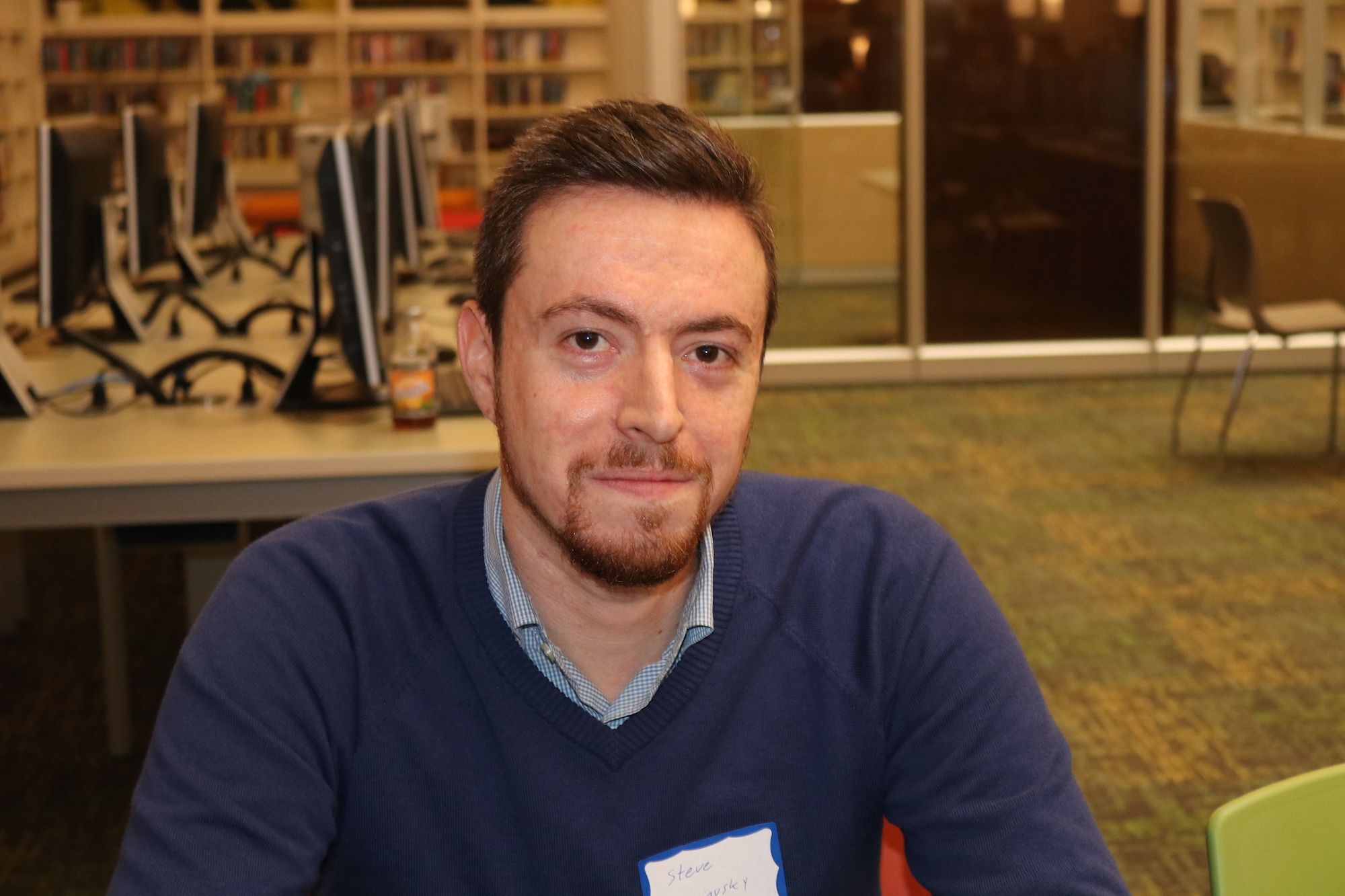
PARTY: Term-Limits Party
As the sole candidate from the Term-Limits party, Steve Cherniavsky is running on a platform of only staying in office for two terms if elected. It’s his primary issue and one he hopes to see put in place for all elected officials on City Council. Cherniavsky is the son of Ukrainian immigrants who moved to Philadelphia from Israel. In 12 years, he says he hasn’t seen much change outside of Center City and wants it to spread more evenly across Philly’s neighborhoods. His version of change involves more than just Democrats.
“It’s a matter of making a change, not just a single party.”
SAVING LIBRARIES
Like many of the other candidates, Cherniavsky cited the lack of funding as the main issue for saving Philadelphia’s libraries. He cited statistics that placed Philadelphia tied for fifth in overall city budget in the country, but 15th for library funding to support his argument.
POVERTY AND WAGES
Cherniavsky pinpointed poverty as one of the many things he’s seen stagnant progress over more than a decade in the city, and one of the other reasons he’s running (outside of imposing term limits). His solution is finding ways to bring more businesses to the city, and still sees “tremendous potential” in that arena for neighborhoods outside of Center City.
GUN VIOLENCE
When thinking about the city’s gun violence epidemic, Cherniavsky was reminded of his family’s time in Israel, where the threat of bombing and violence was an everyday struggle. Like many at the forum, he draws the correlation between violence and poverty. The desperation is what creates the circumstances where gun violence spikes and he’s committed to improving them.
ACHIEVING GOALS IN OFFICE
Cherniavsky took this time to remind the audience of his goal of having term limits for elected officials in Philadelphia — including himself if elected.
OPIOID CRISIS
Cherniavsky did not comment on the opioid crisis.
PHILADELPHIA THE “WELCOMING CITY”
As an immigrant himself from Israel, Cherniavsky knows the reality of the majority of immigrants that come to the country and city willing to work hard to make a better life for themselves and their family. He supports Philly’s “Welcoming City” status and efforts to give immigrants a chance to make a living.
MASS INCARCERATION/RACIST JUSTICE SYSTEM
Cherniavsky did not comment on mass incarceration or racism in the justice system.
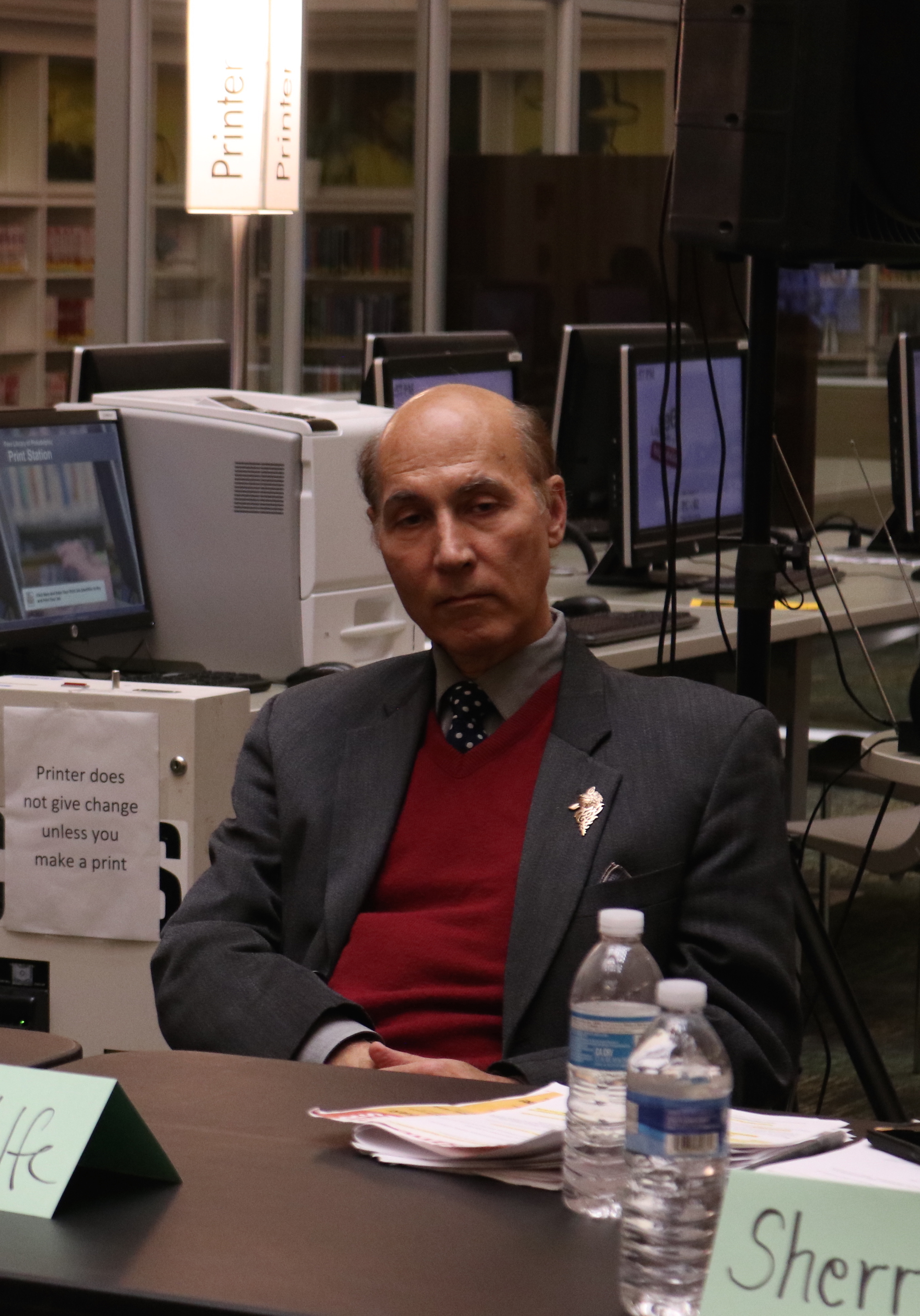
PARTY: Republican
A late show for the forum, Matt Wolfe is one of the many new Republicans vying for a minority seat on City Council on November 5. A servant on the board of many community organizations in West Philly since his graduation from college, Wolfe was also once a Deputy Attorney General and served in the administration of Pennsylvania Governor as Chief Counsel to the Department of Labor and Industry. Now he wants a spot on Council.
GUN VIOLENCE
As a member of the Police Advisory Council in District 18, Wolfe has engaged in the practice of community policing and is a proponent of building strong communications between law enforcement and neighborhoods as a combatant of gun violence. He also, like many at the forum sees poverty as a major contributor to the rise in gun violence. For him, another solution is also to get more people jobs.
“If you have a job, you’re not going to have a gun.”
ACHIEVING GOALS IN OFFICE
Wolfe brought up his experience as the leader of a few RCOs (registered community organizations) as proof of his ability to lead in the position. With his experience in state government, Wolfe is also confident in his ability to get compromises on the state level and warned of losing that connection if Republicans are voted out.
“A stronger Republican Party equals a stronger city.”
OPIOID CRISIS
In an appeal to the attendance, Wolfe ventured to say that everyone attending the forum knew someone affected by the opioid crisis. He looks at the opioid crisis as a national issue rather than just one that affects Philly and the solution lies in educating the population to see the signs of addiction earlier. Wolfe is not a supporter of safe injection sites, believing they “help some, but harm more.”
The only Democratic at-large candidate to respond to the invitation was Alan Domb, but he was a no-show, along with Libertarian candidate Maj Toure.
There are ten third-party candidates vying for an at-large City Council spot and five Republican candidates including incumbents David Oh and Al Taubenberger.










DEJE UN COMENTARIO: